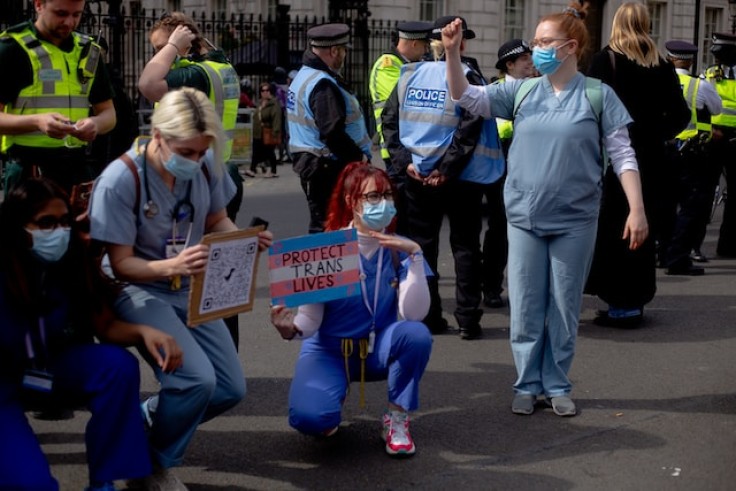
Michigan made a significant stride in protecting LGBTQ minors as Gov. Gretchen Whitmer signed legislation on Wednesday banning the discredited practice of conversion therapy, according to ABC. This action positions Michigan as the 22nd state in the US to prohibit any form of therapy aimed at altering a person's sexual orientation or gender identity.
Conversion therapy, widely condemned for its lack of scientific basis and harmful effects, purports to change LGBTQ individuals to conform to heterosexuality or traditional gender norms. However, the new legislation explicitly excludes counseling or support provided to individuals undergoing gender transitions.
Protecting LGBTQ Minors: Governor Whitmer Signs Landmark Legislation Against Conversion Therapy
Governor Whitmer, whose child is LGBTQ, stressed the importance of banning this "horrific practice" to create an environment where individuals can embrace their authentic selves. In 2021, she signed an executive directive prohibiting state and federal funds from being used for conversion therapy with minors.
The advocacy group The Trevor Project reports that approximately 15% of LGBTQ minors in Michigan experienced threats or exposure to conversion therapy in 2022. LGBTQ rights advocates have long decried this practice, pointing to research that links conversion therapy to an increased risk of suicide and depression among its victims.
According to NBC News, the ban received approval from the Michigan Senate last month in a 21-15 vote, with one Republican joining Democrats in support. The state House had previously passed the legislation. Some opposing Republicans expressed concerns about potential interference with the work of mental health professionals.
Defending the rights of Michigan's LGBTQ community has been a priority for Democrats since gaining control of the state government earlier this year. In March, lawmakers amended the state's civil rights act to protect LGBTQ individuals and permanently outlaw discrimination based on sexual orientation or gender identity.
Efforts to ban conversion therapy have been underway in other states as well. Minnesota, where Democrats also assumed control recently, passed a comparable ban on conversion therapy in April. Meanwhile, in Arizona, Governor Katie Hobbs issued an executive order last month prohibiting state agencies from funding or supporting conversion therapy.
The Human Rights Campaign (HRC) declared a state of emergency for the LGBTQ community in May due to an "unprecedented and dangerous" surge in discriminatory legislation across state legislatures. This marked the first time in the HRC's 43-year history that such an emergency declaration has been made.
With the banning of conversion therapy in Michigan, LGBTQ youth in the state can find solace in knowing that the harmful practice is no longer legally sanctioned. The measure is seen as a crucial step towards creating a more inclusive and accepting environment for all individuals, regardless of their sexual orientation or gender identity.
Growing Movement: States Nationwide Take Action to Prohibit Harmful Conversion Therapy
Major medical and psychological associations, such as the American Psychiatric Association and the American Medical Association, have widely discredited conversion therapy. Critics argue that it not only lacks a scientific basis but also poses serious risks to the mental and emotional well-being of those subjected to it. The practice often stigmatizes and denigrates LGBTQ individuals, perpetuating harmful stereotypes and causing feelings of shame and self-loathing.
Research has shown that LGBTQ youth who undergo conversion therapy are more likely to experience depression, anxiety, and suicidal thoughts. Banning this practice is crucial to ensuring the safety and well-being of vulnerable LGBTQ minors, who are often at higher risk of facing discrimination and prejudice.
The Trevor Project, a leading LGBTQ youth suicide prevention organization, reports that LGBTQ youth from highly rejecting families are more than eight times more likely to attempt suicide than those from supportive families. By prohibiting conversion therapy, Michigan sends a powerful message of support and acceptance to its LGBTQ youth population, promoting mental health and well-being.
While the ban on conversion therapy is a significant step forward, advocates recognize that there is still much work to be done to protect LGBTQ individuals from discrimination and prejudice. The fight for equality and acceptance continues, and Michigan's decision to ban conversion therapy serves as a beacon of hope for the future.
In conclusion, Michigan's ban on conversion therapy for LGBTQ minors marks a critical victory in the fight against this harmful and ineffective practice. By enacting this legislation, the state takes a stand for LGBTQ rights and sends a clear message that all individuals should be respected and accepted for who they are.
As the 22nd state to outlaw conversion therapy, Michigan joins a growing movement to protect LGBTQ youth from the dangers of this discredited practice. While challenges may remain, this momentous step towards equality and inclusivity brings hope for a brighter and more accepting future for all LGBTQ individuals in Michigan and beyond.
Related Article : Increasing Anti-LGBTQ Legislation Triggers Human Rights Campaign To Declare State of Emergency